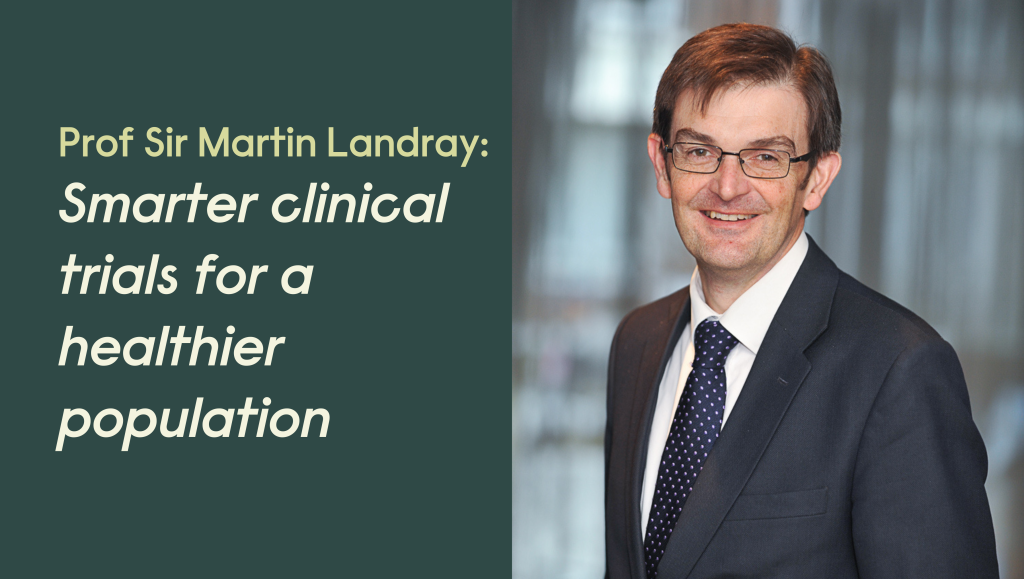Smarter clinical trials for a healthier population
Protas Chief Executive Prof Sir Martin Landray writes for the REFORM think tank about how clinical trials are key to prevention, early detection and treatment of common diseases.

In November, Professor Sir Chris Whitty, England’s Chief Medical Officer, published his annual report on health in an ageing society.
The report, which outlined actions to improve the quality of life for older adults, highlighted a troubling phenomenon – the growing proportion of our population living with poor health and the huge disparities in the length and quality of life between different socio-economic groups.
The stark reality is that there are a growing number of older people living with multiple common diseases, many of which may well be preventable. Whitty rightly argues that “we have a responsibility in medicine, government and wider society to plan to ensure that older age is as healthy, independent and enjoyable as possible into the future”.
Ill health and the burden of common diseases are a major public health threat and arguably will have greater consequences on health systems around the world than even COVID-19. If we are to improve the quality of life of our ageing population then we need to urgently tackle the common diseases that affect them.
Prevention, early detection and treatment will be key to slowing the onset and progression of diseases and reducing their impact on quality of life.
The good news is that we are already well-positioned to do this thanks to the strength of our life sciences sector.
With the advent of the genomic revolution and advances in data science making it easier to identify potential new drug targets and indeed new drugs, there is an abundance of new opportunities to change the way we prevent common diseases. We’ve seen that already in the development of the first drugs for dementia (previously considered by many to be an untreatable disease) and obesity.
But as with all treatments, will these new drugs live up to their promise? Are they effective and for whom? Are they safe? And critically, from a health economics perspective, are the benefits sufficiently great to be worthwhile and affordable at the scale that they would need to be used?
The answer to all these questions, and more, is smarter and more inclusive clinical trials.
Clinical trials were central to our response during the COVID-19 pandemic. For example, the RECOVERY Trial demonstrated the value of running efficient clinical trials to understand which treatments are beneficial for those with severe COVID-19 – the discovery of dexamethasone, a cheap steroid drug, has subsequently saved hundreds of thousands of lives.
The success of the RECOVERY Trial was driven by the clear focus of the protocol on providing compelling answers to the central question, “which drugs improve survival for patients hospitalised with COVID-19?” and the recognition that the trial must place minimal burden on clinicians and patients so that participation was as easy as possible.
But success was also made possible by the clear alignment of interests. Namely, this was between individual patients and doctors confronting the disease; and with the interests of pharmaceutical companies who were developing new treatments for COVID-19 and the health systems, drug regulators and governments trying to respond to the crisis. When results from the trials were clear, decision-making became substantially easier.
The blueprint for smarter trials is there. If we are serious about tackling the rising health burden then we need to apply this model beyond COVID-19 to other common diseases. This is precisely why we created Protas, a not-for-profit organisation dedicated to the design and delivery of large, randomised clinical trials for common and life-threatening diseases.
As with RECOVERY, we need to align interests to have impact. For industry, we must establish opportunities that encourage and facilitate the development and evaluation of treatments for these big common diseases through clinical trials.
For patients and doctors, we need to remove the burden of clinical trials and make clear the benefits and opportunities to drive participation. If a trial asks a good question, such as “will this drug prevent me from developing dementia?” and makes involvement easy, the chances of its success are much higher.
For regulators such as the MHRA in the UK, we need to ensure that clinical trials are able to generate the information needed to make informed decisions on the safety and efficacy of medicines. That ability will be greatly enhanced by improvements in the rules and guidelines that dictate how trials are conducted. Now is the time to embrace advances in technology, utilise information already collected as part of day-to-day healthcare, and ensure that patients and the public are welcomed as important and knowledgeable contributors to the whole process.
For governments and health systems (such as the NHS in the UK), we need to identify opportunities for new drug development for the conditions that put huge pressures on the health and social care system, such as obesity, hypertension and cardiovascular diseases, respiratory diseases, cancer, and dementia.
There are signs of progress and many of the recommendations of Lord O’Shaughnessy’s report on UK commercial clinical trials are starting to be adopted. For example, there has been substantial improvement in the time taken for MHRA to approve trial protocols and for individual trials to commence enrolment of patients.
But there is still more to do.
As the UK’s COVID-19 inquiry rolls on there is a risk that “pandemic fatigue” is setting in with our political leaders and policymakers. And we should beware a return to “business as usual” without learning the lessons and striving for “better business than before”.
There is a serious risk that we do not take forward the lessons of that health crisis, to tackle the growing crisis of common diseases particularly in older adults. Smarter trials showed their worth in the pandemic, and are precisely the booster we need to solve these ongoing challenges.
This article was originally published online on REFORM (Wednesday 6 December 2023).